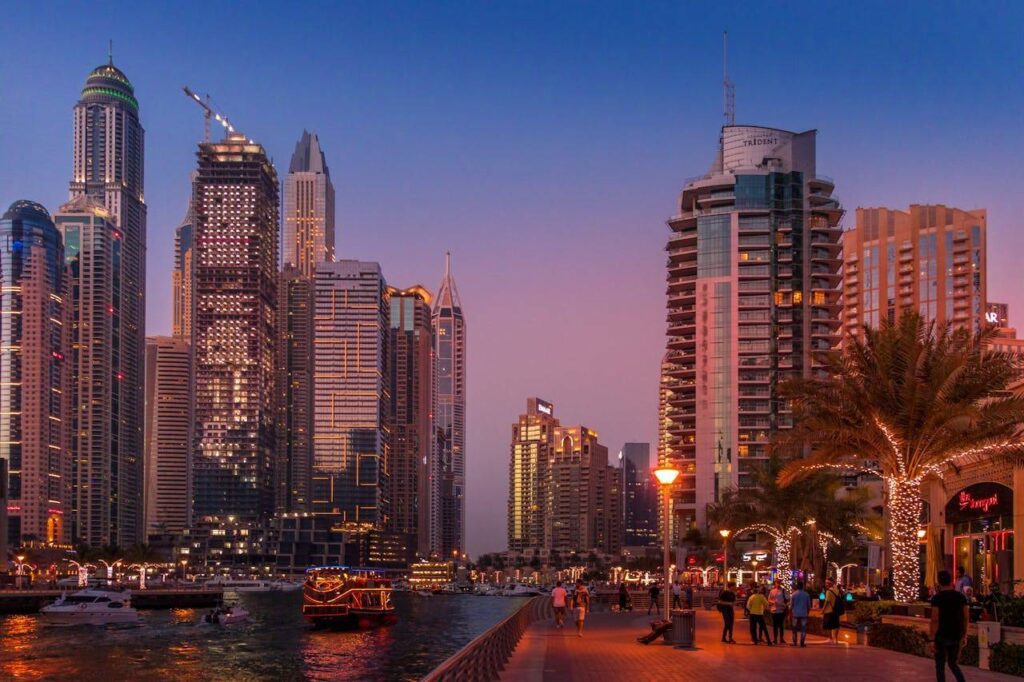Dubai real estate market in 2025 is experiencing an unprecedented surge, attracting investors from around the globe. The city’s strategic location, investor-friendly policies, and robust economic growth make it a prime destination for real estate investment. This article delves into the factors driving Dubai’s real estate boom, the opportunities it presents, and what potential investors need to know.
A Snapshot of Dubai’s Real Estate Market in 2025
In the first half of 2025, Dubai’s property sales reached AED 431 billion, marking a 25% increase from the previous year. This growth underscores the city’s resilience and appeal in the global real estate landscape.
Key Drivers of Dubai’s Real Estate Boom
1. Strong Economic Growth
Dubai’s economy is projected to grow by 4.7% in 2025, up from 3.9% in 2024. This growth is fueled by diversification into sectors like technology, tourism, and finance, reducing reliance on oil revenues.

2. Attractive Rental Yields
Investors are drawn to Dubai’s high rental yields, which range between 5% and 9%, significantly outperforming other global cities like London and New York.
3. Favorable Tax Environment
Dubai offers a tax-free environment for property investors, with no annual property tax, no capital gains tax, and no inheritance tax. This tax efficiency enhances the return on investment for property owners.

4. Strategic Infrastructure Developments
Ongoing infrastructure projects, such as the Dubai 2040 Urban Master Plan, are enhancing connectivity and livability, making the city even more attractive to investors and residents alike.
5. Growing Population and Expatriate Community
Dubai’s population is approaching 4 million, with expatriates constituting a significant portion. This demographic trend drives demand for residential properties, particularly in freehold areas.

Investment Opportunities in Dubai’s Real Estate Market
Residential Properties
The demand for residential properties, especially in prime locations like Palm Jumeirah and Downtown Dubai, remains strong. Investors can expect steady rental income and potential for capital appreciation in these areas.
Commercial Real Estate
Dubai’s commercial real estate sector is thriving, with increasing demand for office spaces, retail outlets, and hospitality establishments. The city’s status as a business hub in the Middle East contributes to this growth.
Off-Plan Developments
Investing in off-plan properties offers opportunities to purchase at lower prices before completion. Developers in Dubai are offering flexible payment plans and assured returns, making this an attractive option for investors.
Risks and Considerations
While Dubai’s real estate market presents lucrative opportunities, potential investors should be aware of certain risks:
- Market Volatility: Like any real estate market, Dubai’s property sector can experience fluctuations. It’s essential to conduct thorough research and consider long-term trends.
- Regulatory Changes: Staying informed about changes in property laws and regulations is crucial to ensure compliance and protect investments.
- Supply and Demand Dynamics: Overbuilding in certain areas can lead to oversupply, affecting rental yields and property values.
Conclusion
Dubai’s real estate market in 2025 offers a compelling proposition for global investors seeking high returns, tax advantages, and a stable economic environment. By understanding the key drivers and opportunities, investors can make informed decisions to capitalize on this booming market. The city’s appeal lies not only in its financial incentives but also in its strategic vision, modern infrastructure, and ability to adapt to global trends, making it a highly attractive destination for both short-term and long-term investments.
One of the most significant advantages of investing in Dubai is the city’s tax-friendly environment. Unlike many major global cities, Dubai imposes no capital gains tax on property sales, no annual property tax, and no inheritance tax. This framework allows investors to retain more of their profits and reinvest in additional assets, creating a snowball effect of financial growth. Furthermore, the city’s transparent property regulations, governed by the Dubai Land Department, ensure that ownership processes are secure and streamlined, reducing risks associated with property transactions.
Do follow UAE Stories on Instagram
Unwind in Style at Al Wathba Desert Resort with New All-Inclusive Summer Escapes














